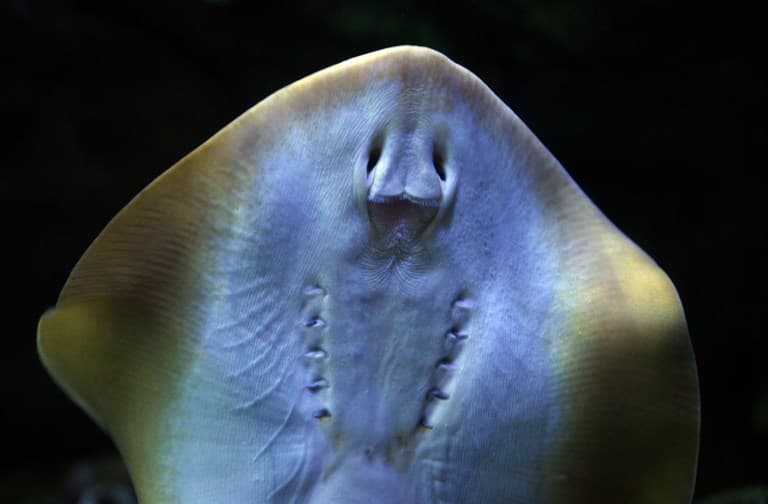Holidaymakers warned over dozens of stingrays near Mediterranean coast

Authorities in the south of France have warned swimmers to take care due to the presence of potentially dangerous stingrays off the coast of the Mediterranean.
The warning came after several dozen purple stingrays were spotted in recent days particularly in the southern Var department and Corsica.
The video below shows a stingray filmed in the southern French port of L'Estaque.
The rays measure 80cm to 90cm across their wingspan and spend most of their time living far out to sea.
Injuries are caused by their venomous tail spines, with many victims of stingray related injuries suffering from nausea, vomiting, diarrhea, extreme pain and muscle cramps.
Stingray injuries can also prove fatal for young children or those who are frail and swimmers have been asked to report any sightings to the authorities.
However, although they can be dangerous, stingrays are not known to be aggressive.
"These stings are exclusively defensive, they do not even use them to hunt," Olivier Dufourneaud, director of the Oceans Policy Department at the Oceanographic Institute of Monaco told the French press.
Nevertheless, if you come across one of these animals while swimming, do not try to interact with them and be sure to keep your distance.
"There are 32 species of rays in the Mediterranean," said Olivier Dufourneaud, adding that half of these are in danger of becoming extinct.
"They come to breed and give birth near the coast during the summer. Summer is the time of year when the probability of seeing these animals is highest."
And it turns out that their presence is good news in terms of biodiversity.
"Rays are at the top of the food chain, like sharks, they are good indicators of the global state of the seas and oceans. Their presence shows a good distribution of smaller fish," said Dufourneaud.
So, is their presence the result of global warming?
Not necessarily, according to Dufourneaud.
"It's impossible to draw statistical conclusions from a single summer," he said. "If the warming has an impact on the behaviour of certain species, we cannot conclude anything with regard to these rays for the moment. Because, again, they are getting closer to the coast in August to give birth, that's quite normal."
Several studies have shown a change in Mediterranean marine fauna due to warming waters and overfishing.
"Overall it must be said that the Mediterranean is a sea that is in danger," said Dufourneaud.
"But for the moment more because of the damage of overfishing than for climatic reasons. If jellyfish increase (which is very difficult to measure and confirm) it is mainly because their predators are caught in fishing nets."
READ ALSO:
 Photos: Flickr/AFP
Photos: Flickr/AFP
Comments
See Also
The warning came after several dozen purple stingrays were spotted in recent days particularly in the southern Var department and Corsica.
The video below shows a stingray filmed in the southern French port of L'Estaque.
The rays measure 80cm to 90cm across their wingspan and spend most of their time living far out to sea.
Injuries are caused by their venomous tail spines, with many victims of stingray related injuries suffering from nausea, vomiting, diarrhea, extreme pain and muscle cramps.
Stingray injuries can also prove fatal for young children or those who are frail and swimmers have been asked to report any sightings to the authorities.
However, although they can be dangerous, stingrays are not known to be aggressive.
"These stings are exclusively defensive, they do not even use them to hunt," Olivier Dufourneaud, director of the Oceans Policy Department at the Oceanographic Institute of Monaco told the French press.
Nevertheless, if you come across one of these animals while swimming, do not try to interact with them and be sure to keep your distance.
"There are 32 species of rays in the Mediterranean," said Olivier Dufourneaud, adding that half of these are in danger of becoming extinct.
"They come to breed and give birth near the coast during the summer. Summer is the time of year when the probability of seeing these animals is highest."
And it turns out that their presence is good news in terms of biodiversity.
"Rays are at the top of the food chain, like sharks, they are good indicators of the global state of the seas and oceans. Their presence shows a good distribution of smaller fish," said Dufourneaud.
So, is their presence the result of global warming?
Not necessarily, according to Dufourneaud.
"It's impossible to draw statistical conclusions from a single summer," he said. "If the warming has an impact on the behaviour of certain species, we cannot conclude anything with regard to these rays for the moment. Because, again, they are getting closer to the coast in August to give birth, that's quite normal."
Several studies have shown a change in Mediterranean marine fauna due to warming waters and overfishing.
"Overall it must be said that the Mediterranean is a sea that is in danger," said Dufourneaud.
"But for the moment more because of the damage of overfishing than for climatic reasons. If jellyfish increase (which is very difficult to measure and confirm) it is mainly because their predators are caught in fishing nets."
READ ALSO:
 Photos: Flickr/AFP
Photos: Flickr/AFP
Join the conversation in our comments section below. Share your own views and experience and if you have a question or suggestion for our journalists then email us at [email protected].
Please keep comments civil, constructive and on topic – and make sure to read our terms of use before getting involved.
Please log in here to leave a comment.